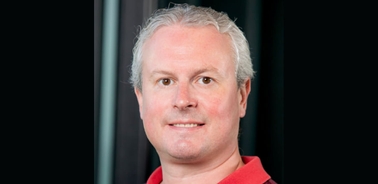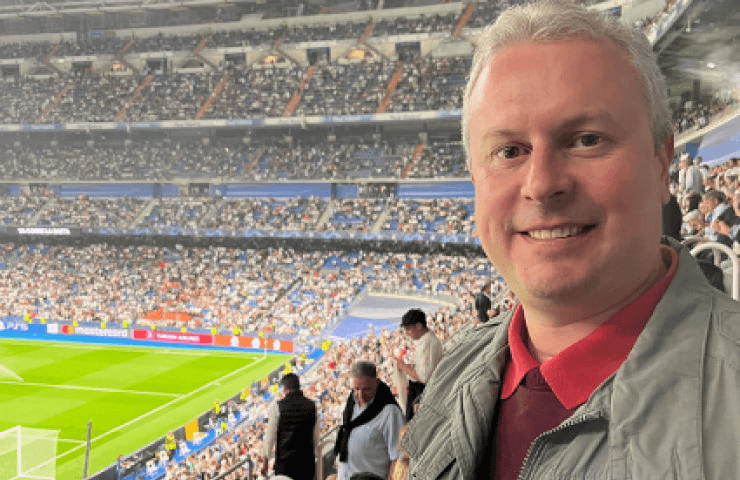Faculty Spotlight: Robert Polding

Meet the Academic Director of the Bachelor in Data and Business Analytics.
Most students at IE School of Science and Technology know Dr. Robert Polding thanks to his extensive course load in database design, management information systems, project management, programming and big data. But the Academic Director for the Bachelor in Data and Business Analytics is also an active researchers in subjects of AI, e-commerce, web applications, apps, RFID augmented and mixed reality, and database technologies.
Beyond teaching, his entrepreneurial activities distinguish him from other researchers. He has developed software since he was 16, selling an educational learning software to revise his high school exams. In 2003, he created digital museum tour guides, using PDAs and RFiD technology, as well as one of the first location-aware technologies, years before the advent of mobile phones. In 2010, he moved to Spain from Britain and worked as a contactor at Indra and the Spanish Army before joining IE in 2016.
Get to know our Academic Director better.
What brought you to IE? Where were you before? And what keeps you here?
A long-time friend came to me back in 2014 while I was working as a deputy headteacher in a Madrid private school, and he told me that he had discovered a fantastic place to work! Next, I was in Maria de Molina 31BIS (which I struggled to find!) for an interview. I was impressed by the university's values of diversity, entrepreneurship, and innovation, but what attracted me was its focus on humanities and the belief that it benefits students and makes them critical thinkers. As a result, I decided to quit as a head teacher and move back into higher education, and I certainly don't regret it!
What trends are you most excited about in science and technology and why?
Technology's role in making the planet more sustainable is the most exciting thing this century. I was a director for Greenpeace for 13 years, and seeing the transition to green technologies has been a privilege. I remember when filthy fossil fuels or dangerous nuclear power were the only ways to generate electricity. Today, we have witnessed the transition to green solar, wind, and hydroelectricity. It's one of humanity's proudest achievements, going from such damaging technology to more than 50% of our electricity coming from renewable sources. The future is also bright with the possibility of nuclear fusion, which promises unlimited power and hardly any waste, and the end of personal transport with the coming self-driving "robotaxi" revolution.
Have you ever had an a-ha moment while teaching that furthered your research? What was it?
Most of my "a-ha" moments came while working as a company director in the UK, which has influenced my teaching and career significantly. One realization I made was that engineers alone cannot design great products. They need a team of experts to support them, from designers to researchers. I realized that user-centered design results in better products that people like. As a result, I went on to complete a PhD in user-centered design.
What book do you wish your students would read before taking your class and why?
Getting Things Done by David Allen. This book is a methodology for organizing life and contains some of the best tips and advice on maximizing productivity and reducing stress. This methodology has dramatically influenced how I generally do things - at work and at home. David Allen spent 40 years coaching the world's top CEOs, and this book is a testament to his experience. It can make anyone more efficient and productive.
Please name one of your articles or studies you feel addresses the pressing issues for 2024.
Silicon Valley has its sights set on AI as the latest "big shiny thing" they want to monetize. I wrote an article on how large language models have become the face of this new technology and the first tool in the field that an average person can use. While the LLM bubble is bound to burst eventually, this technology will continue to be the voice of AI as we advance and will dramatically improve voice assistants and search in the coming years. I am excited about how this will evolve and improve and how we can use it to help make our lives easier.
Whose research of your IE colleagues do you find interesting? Why?
I am involved in the Healthcare Impact Accelerator, and we are doing some fantastic work and projects. For example, we are working with a major pharmaceutical company and using data science to help decrease the time it takes for new drugs to get to market. It could mean critical new treatments are available sooner, impacting people's lives.
Tell us one personal thing about yourself that none of your students know. A hobby, sport or talent? Strange fact? Unusual interest?
I am utterly addicted to crime novels. I spend at least two hours a day reading and barely watch TV (except for the occasional news show). I am reading The Mountain Shadow by Gregory David Roberts, a vast, thick novel about the lives of Indian criminals living in 1980s Mumbai. I am a sucker for a good story, and I always find film adaptations of books disappointing as they never live up to the story and images I have in my mind while enjoying a good book.
